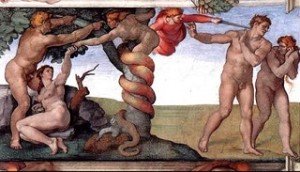
Arquivo para October 10th, 2016
The Symbolic of Evil
Augustine of Hippo (St. Augustine for Catholics), had written that  “evil is the absence of good”, but what does evil persists, because we still talk of wars and atrocities?
“evil is the absence of good”, but what does evil persists, because we still talk of wars and atrocities?
The philosopher Paul Ricoeur, who died in 2005, had written on the question of Finitude and Culpability in the 60s, and volume two Symbolic of Evil, was translated and published by Editions 70, Portuguese in 2015, in which he demonstrates why the subject modern ceased to be the center of that part of a philosophical reflection today.
The French philosopher shows that Augustine (354-430 AD) when attempting to disallow Manichaeism, formulates a no knowledge of evil as the approach the concept of original sin, establishing a framework from which evil is to exist to the extent that the man passes through generations of his descendants, and if we had a way back to original sin arrive.
Ricoeur will support other bias that the concept of evil is based on original sources, from which we can find the existential origin of evil, and who could have done it, so the misdeed and the author of this action are contained in symbols and myths created through human history, therefore, that is, the “desire to be and effort to be” known phrase of Spinoza, there is therefore an anthropological and mythological construction that gives life to this “symbol”.
There is therefore a possibility of a sharp understanding, finished “before the evil apohria”, that means we face a rational difficulty to define it, but as a symbol exists in all human history.
Kant, as well as all the idealism, say that it is human freedom but to recognize evil through man and freedom is itself a free movement of a being who takes bad about themselves, time in the same way this statement is the freedom that recognizes its responsibility, but confesses consider evil as evil committed, and confesses that he was in his hands not to have committed, so evil is not justified by freedom.
Then evil has no freedom as its original source, but only as its author, so free will is justified, but does not explain the confession of responsibility leads to the condition that there is a primary source from which comes the realization that it is evil.
Ricoeur then takes care to show that ” fallibility”, i.e. the “idea that man is constitutionally fragile and can fall,” an element “fully accessible to pure reflection and points out a feature of the human being” exposed to a multitude of faults, which against not surprising that slide, but there is a profound distinction between fallibility and failure.
Says the philosopher who is the first natural nature, biological, while the second is moral or cultural.
Ricoeur argues that human fallibility e is only one condition, “the possibility of moral evil”, inscribed in the constitution of man, but between fallibility and the lack there is a gap, a leap that needs to be understood.
“Our anthropological reflection is before this jump; ethics, by contrast, comes too late. To surprise even the jump time, we need to take a new route, apply a new style of reflection, focusing on the confession that consciousness recognizes the jump and evil symbols by which expressed this confession. “(Ricoeur 1960)
Ricoeur, Paul. La symbolique du mal. Paris: Aubier-Montaigne.1960.

